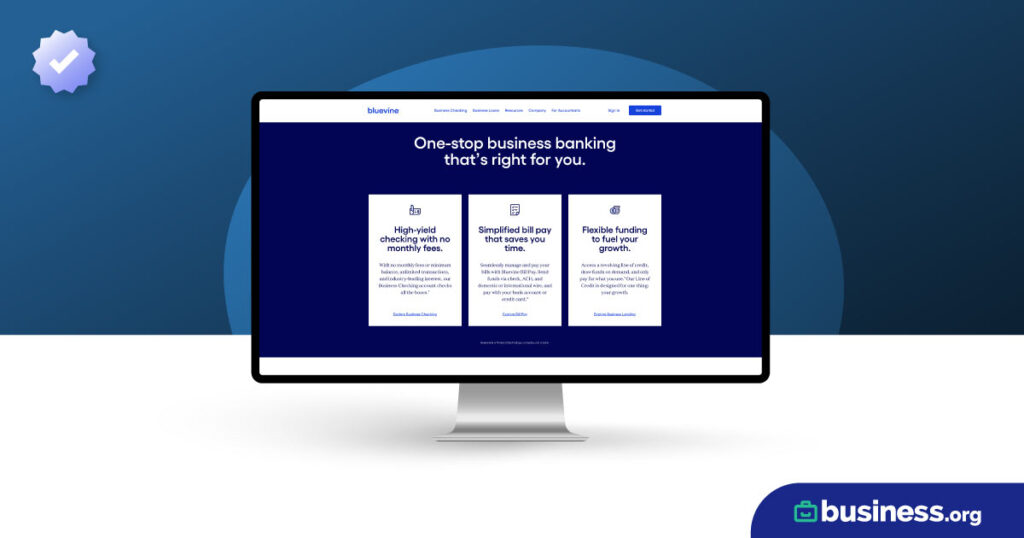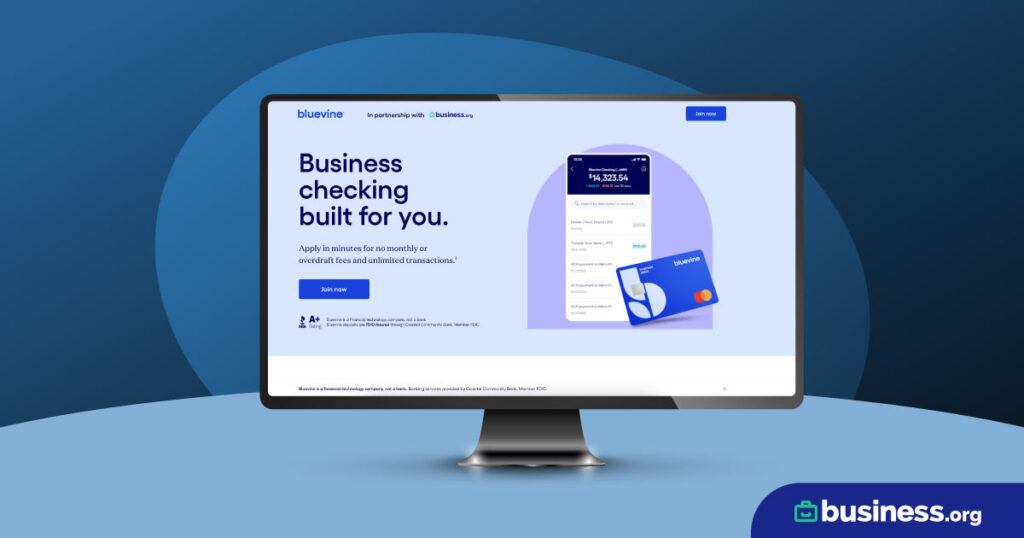We are committed to sharing unbiased reviews. Some of the links on our site are from our partners who compensate us. Read our editorial guidelines and advertising disclosure.
Best Compound Interest Investments 2025
Data as of 2/15/23. Offers and availability may vary by location and are subject to change.
Compound interest lets your money earn more in interest―at least in the long run. But what account types and financial institutions offer the best compound interest investments for your business?
In this article, we’ll explain what compound interest investments you can choose from―and we’ll tell you our favorite sources for each option.
If you’re in a hurry, know that most businesses will do best with an interest-bearing checking account, like the one offered by Bluevine. We’ll give you all the details on those―and your other options―as we go.
Best Compound Interest Investments
- : Best for everyday usage
- : Best for simple saving
- : Best access to savings
- : Best for locked-in rates
- : Best for safe investing
How Does Compound Interest Work?
Compound interest works by letting your interest earn interest ― which means you earn more than if you only earned interest on your principal.
Let’s use an example.
Imagine you put $1,000 in an account that earns 5% APY (annual percentage yield). Initially, you’ll earn $50 in interest, making your total amount $1,050.
Now, with simple interest, you’d just continue to earn money on that $1,000. So after the next interest-earning period, you’d end up with $1,100.
But with compound interest, you earn interest on that $50 in interest you already earned. So you end up with another $52.50 in interest, bringing your total to $1,102.50.
That may not seem like a big difference, but it can really add up over time. Over 20 years, you’d earn $712.64 more in interest with compound interest than with simple interest. And obviously the more money you invest to begin with, the more interest you’ll earn.
By signing up I agree to the Terms of Use and Privacy Policy.
Compound Interest for Small Business
Compound interest adds up over time―which is why compound interest accounts aren’t always the best investment strategy for small businesses.
After all, rather than letting your money sit and slowly compound, you could invest that money directly into your business. You could do more marketing, hire more employees, buy more inventory, and do other things to boost revenue.
That doesn’t mean you can’t look for compound interest investments for your business. But it does mean you should focus on investments that let you access your funds regularly―like interest-bearing checking.
Interest-Bearing Checking: Best for Everyday Usage
Data as of 2/15/23. Offers and availability may vary by location and are subject to change.
For most businesses, an interest-bearing checking account offers the best compound interest investment.
That’s because interest-bearing checking accounts give you nearly unlimited access to your money. You can add more funds whenever you want. You can use checks (with most accounts), a debit card, an ATM card, ACH transfers, and more.
That, in turn, means that you can take advantage of any revenue-boosting opportunities that come your way. You won’t have to wait for the end of a term (like you would with a CD or bond) to use your money to buy inventory, for instance. And you won’t need to count transactions (like you would with savings accounts) to make sure you won’t get charged extra fees.
But at the same time, you can earn a decent interest rate ― up to 2.0% with Bluevine, our favorite business checking provider. Bluevine will pay you that 2% on balances up to $250,000, which makes you an extra $5,000 a year just for going about your business. And with the right bank, you won’t pay much (if anything) in fees.
Do make sure you find the right bank, though. Some banks offer very low interest rates and charge a lot of fees. And no matter your bank, understand that interest-bearing checking accounts have variable interest rates that will change over time.
Still, an interest-bearing checking account gives you all the benefits of interest with the flexibility of everyday checking. And that makes it the best option for everyday usage―and the best investment for most business owners.
High-Yield savings: Best for Simple Saving
Data as of 2/15/23. Offers and availability may vary by location and are subject to change.
If you prefer to set money aside in a savings account, we recommend a high-yield savings account.
These accounts work just like any standard savings account, except they earn more interest. Lili earns 1.5% APY―much more than the 0.1% you might find offered by a traditional savings account. But like any savings account, these let you add new money whenever you like. And they tend to have few banking fees.
That said, high-yield savings accounts have the same downsides as normal savings accounts. You often can’t write checks from your high-yield savings account, for example. And most banks limit you to just six transactions each month, which keeps you from using your saved funds all that much. Of course, if you want a savings account to keep you from spending, then that limit won’t be a problem.
So for basic savings needs, we suggest a free high-yield savings account from Lili Bank.
Money Market Savings: Best for Access to Savings
Data as of 2/15/23. Offers and availability may vary by location and are subject to change.
If you like the idea of a savings account but want a little more access to your money, try a money market savings account.
Money market accounts work a whole lot like standard savings accounts, but they usually give you a couple more ways to use your funds. Money market accounts let you write checks, for one. And they often come with an ATM card that lets you withdraw funds from your account. So you still get a good interest rate, but your funds are a little easier to use.
That doesn’t mean you can just withdraw money whenever you want, though. Most banks still limit money market account holds to six transactions each month. And like the other accounts we’ve discussed, money market accounts come with variable interest rates. So while you may get a great rate when you sign up, you shouldn’t count on keeping that rate forever.
But if a savings account with a little more access sounds good, then a money market savings account―like the one offered by Axos Bank―might be just what your business needs.
Certificates of Deposit: Best for Locked-in Rates
Data as of 2/15/23. Offers and availability may vary by location and are subject to change.
Nervous about your interest rate changing? Get a certificate of deposit, or CD.
Certificates of deposit lock in your interest rate. That means you won’t be affected by plunging interest rates. (On the other hand, it means you won’t be able to benefit from rising interest rates.) In either case, you’ll know your exact rate when you open up your account. And luckily, CD rates often earn higher interest rates than other types of business savings accounts.
CDs have terms ranging from a few days to several years. You can’t access your funds at all during your term (to either add or withdraw money) without paying a fee. Fortunately, you shouldn’t have to pay any other banking fees with your CD―but you might need a big chunk of cash (often over $1,000) to open a CD in the first place.
So CDs won’t work for all business owners―but their locked-in rates may give you peace of mind.
Government Bonds: Best for Safe Investing
Data as of 2/15/23. Offers and availability may vary by location and are subject to change.
Want a safe investment you don’t need to worry about? That’s a government bond.
The U.S. government offers I Savings Bonds and EE Savings Bonds. Both are proven long-term investments. (For reference, the U.S. Treasury is still servicing bonds issued decades ago.) You won’t have to worry about a bank or fintech company going out of business because instead, you’re investing through the government. Plus, these investments have no fees.
Depending on when you buy a bond, you can get a great interest rate. EE Savings Bonds have a fixed interest rate, so you’ll get a locked-in rate for 30 years. I Savings Bonds have a more complicated rate. Your interest rate stays the same, but I Savings Bonds also have an adjustable inflation rate that gets used to calculate your overall rate. So your rate could go up or down during your 30-year term. (You can cash bonds after as little as 12 months, but you will lose some interest as a penalty.)
Put simply, government bonds offer a reliable long-term compound interest investment.
Other Investment Options
The compound interest investments above are the safest, best options for most small businesses. But you do technically have other options.
For example, you could invest in stocks with a dividend reinvestment plan. These plans, also called DRIPs, take any dividends you earn from your stock and reinvest them. That can, in theory, let you use your earnings to get more earnings―much like compound interest.
That said, we don’t recommend DRIPs or similar options (like real estate investment trusts). As we explain in our guide to the stock market, businesses should invest in themselves rather than stocks in most cases.
A checking or savings account can offer a safe place to set aside money and give you some interest. But the stock market is not safe at all―because yes, you could earn some money, but you could lose money too. If you’re interested in investing, it’s best for most small businesses to stick with our top picks for compound interest investments instead.

Want affordable banking with great perks? With Bluevine, you can get a fee-free business checking account―and you can even earn up to $5,000 in interest.
The Takeaway
A good compound interest investment for businesses gives you access to your funds while letting you earn money on interest. For that reason, we recommend interest-bearing checking accounts as the best investment for most business owners. You can get a great high-interest account through Bluevine.
High-yield savings accounts offer a simple solution for basic savings. To get a little more access to your money, go with a money market account instead. You can lock in an interest rate with a certificate of deposit (CD). And for a time-tested investment, you can turn to government bonds.
Keep track of your compound interest account (and your other accounts) with our picks for the best small-business accounting software.
Related Reading
Compound Interest Investments FAQ
To earn compound interest, you’ll need to open an account that earns compound interest. These types of accounts could include money market accounts, certificates of deposit, and more.
To maximize the wealth you earn through compound interest, add in as much principal (your initial deposit) as you can. Then let your money sit and accrue interest. The longer you leave your funds, the greater the effect of your compound interest.
Banks use compound interest on savings accounts and interest-bearing checking accounts. Any compound interest account from a bank lets you earn interest on the money you’ve already earned through interest―which is called compounding. Depending on your bank, your interest can compound anywhere from daily to yearly.








